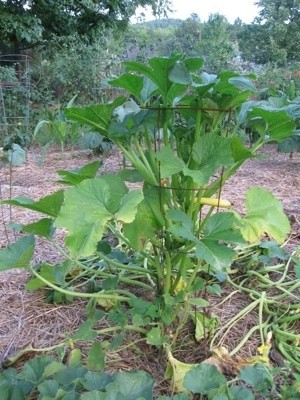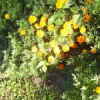 I've often had trouble finding a squash hidden under all the leaves until it was way too big, so this year I put a tomato cage over one squash plant just to see what would happen.
I've often had trouble finding a squash hidden under all the leaves until it was way too big, so this year I put a tomato cage over one squash plant just to see what would happen.
This page contains the following solutions.
The squash vine borer is a very insidious moth that feeds on squash plants. You can tell it attacked your squash when you can see that the stem of the plant itself has been destroyed and gutted out by a disgusting fat white grub.
Here are the questions asked by community members. Read on to see the answers provided by the ThriftyFun community.
My yellow squash doesn't seen to be producing very much, why?
Thank you.
By Pauline Merry from Highland Springs, VA
I'm having the same problem and I live along the line between north and central MS. I looked it up on the net and this is what I found.
www.ehow.com/
You have to have male and female flowering going on. Some plants just product duds. I had to get this info from a master gardener. It is a pollination thing.

Hardiness Zone: 3a
Ragteller from Tofield, Alberta Canada
This is a lovely looking squash, and despite the fact that it looks familiar, I can't seem to find any good sources for identifying it. It looks like it has a tougher, slightly "warted" outer skin, which makes me think it's either an edible ornamental gourd or some type of winter squash (all squash are gourds, but not all gourds are squash). Around here, I've seen these in large bins at grocery stores and home improvement stores. Usually they are just lumped in with hundreds of others and labeled "ornamental" of "fancy." Did you grow this or purchase it?
Ellen
This looks like a fancy zucchini to me. I like to get this kind around Halloween and dry them - makes a pretty decoration. Meanwhile, enjoy!
Did you purchase this in a store, or did you grow it yourself? My brother has a vegetable garden and at the end of the season does not pick all of the yellow and zucchini squash, the following year some of them had self seeded and he had a cross between the two.
I BELIEVE IT'S AN ACORN SQUASH
THERE ARE ROUND ZUCHINI AND SEVERAL DIFFERENT VARIETIES. THERE ARE HEIRLOOM VARIETIES YOU HARDLY EVER SEE ANY MORE AND THERE ARE HYBRIDS THAT ARE NEW TO THE MARKET. IF IT TASTE GOOD AND YOU LIKE IT, KEEP SOME OF THE SEED AND SEE IF YOU CAN GROW IT NEXT YEAR.
I've seen gourds that look a lot like that (two-toned). Do you think a gourd and a zucchini inter-pollinated to produce a new variety? I agree that you should save some seeds to see if you can grow them again.
Why is my yellow squash rotting on the vine when it is halfway to maturity? It is shaded by the corn growing next to it and watered every other day. The summers are hot, always sunny and dry here, (avg. 28 C), so it seems unlikely it could be too much water. Any ideas would be appreciated. Thanks.
Hardiness Zone: 9a
By christine from San Remo, Italy
The most likely problem is blossom end rot. It can be caused by many different things. Extreme soil moisture fluctuation. Rapid plant growth in spring followed by extended dry weather. Excessive rain that smothers root hairs. Or even excess soil salts.
Could you pick the squash up a little so it would not be on the ground?
I am starting to have the same problem with my cucumbers and squash. My questions are, what can you do about soil or drainage at this point, all of the plants are in the dirt and on their way? What is paint brushing?
Something is chewing through the roots of my squash plants, just below the surface. The only bugs I've seen are ants and pill bugs. Could one of these be the culprit? What can I do to stop this before all of my plants are gone? Thanks so much.
Hardiness Zone: 9b
By mandy from Brevard County, FL
That would probably be the squash borer beetle. A google search should tell you what to do.

To prevent heavy infestation, rotate crops and use lightweight row covers until flowering. Cultivate soil in autumn to bring overwintering stage to the surface. Remove all crop residues at the end of the growing season, dust the base of the plant regularly with rotenone, inject Bt into the stems, or handpick the caterpillars by cutting open the stem and killing the caterpillar. You may can save your plant doing this if you catch it in time. Also, if you can, find varieties resistant to borers. good luck.
Sevin dust will kill them. Any garden supply will carry it. Even Walmart has it. The dust is best and easier to apply than the liquid. Be sure to get it on the backs of the leaves and on the ground. Sounds like squash borer to me too. They are really bad on squash.
How can I battle the squash bugs effectively? I lose my squash, cucumber, and melons to them every year! I try to stay up on the eggs, but it's just not enough. I've tried so many pesticides, but they have done more damage then help. I am hoping to find more of an organic solution.
Most home made sprays use oil, garlic juice, dish liquid soap, red pepper, and water. I'd throw it all in, about 1 tablespoon each. I'd also go out with bucket of soapy water and knock any I found into the water.
If you can have hens, I'd let them loose in the garden to pick off the bugs, and then remove from area. I hear guinea fowl are good too, but a bit noisy.
Somebody that sells produce at our farmer's market said that if you wait till about June 1 to plant squash, their cycle has passed and you will not get them. I have never tried this myself so can't say for sure this is true. I am just passing on what she said.
Why are my crookneck squash rotting at the tips?
Hardiness Zone: 9a
Darlene from Carriere, MS
Hi Darlene - there are 2 possible reasons. One is called BER (blossom end rot) a common problem in the early spring with all fruiting plants and it has several causes including cool wet weather, too much nitrogen fertilizer, or inconsistent soil moisture levels. You can find out much more about it by Googleing BER.
The other possible reason is called "fruit abortion" due to incomplete or inadequate pollination. It is also quite common early in the gardening year and usually resolves itself once the plant matures a bit more and the weather settles. If it doesn't, you can hand pollinate the blooms for better success.
The way to tell which is the problem is by the size of the fruit. BER fruit will be close to normal size but with a rotted blossom end. Aborted fruit is usually much smaller.
Gertie
Choanephora Cucurbitarum :
Symptoms:Soft rotting fungus enters fruit from blossom end, rapidly developing a fluffy mass of fruiting bodies.
Control:Cultural practices that reduce fruit contact with soil, or splashing of infected soil onto fruit are beneficial. Fungicide sprays may be required.
How can I keep pests from eating my summer squash without chemicals?
By garden maid from Clarksville, TN
Try a mixture of liquid dish soap (perhaps 1/2 cup) to a gallon of water. Pour it into a spray bottle and spray over the leaves of your plants. Works well for me.
I need a way that is not chemically dangerous to rid my garden of squash bugs that kill the plant overnight.
By Toebeanie
How far apart do I plant summer squash?
By Jennifer
The fruit of my zucchini and crookneck squash plants is growing more slowly than usual and the tips of the fruit are getting soft and rotten. Anyone know what's going on? The plants otherwise look healthy.
By Gary D.
Check out these photos.
This is the first summer squash of the season. I find being in the garden more entertaining than any show on TV or the theater. If you look closely in the picture, you will see that there are going to be more.
That dollar bill used for size comparison really washed out for some reason.
If your squash is producing smaller fruit it can be the result of a number of things, such as watering, fertilizers used, the variety planted, and more. Trial and error may help determine the cause. This is a page about what to do when summer squash is not growing large.
ThriftyFun is one of the longest running frugal living communities on the Internet. These are archives of older discussions.
I have a squash and zucchini problem. Both seem to be dying on the vine. I saw a post about the zucchini and was wondering if you think it's a pollination problem.